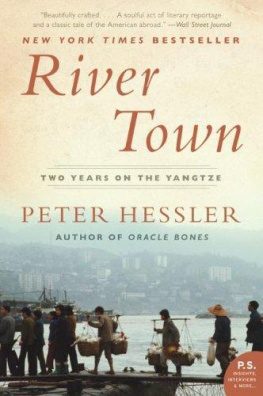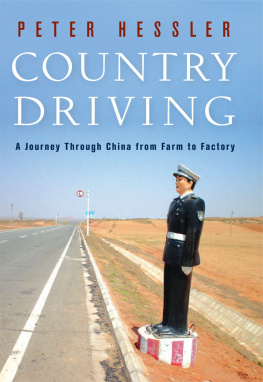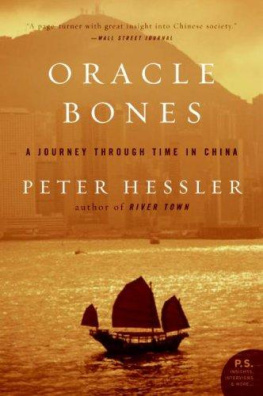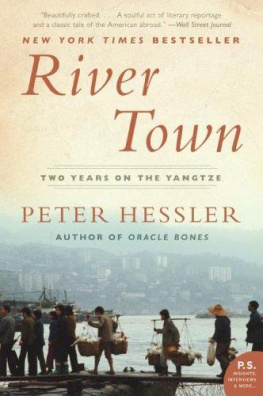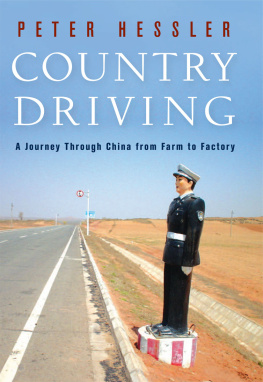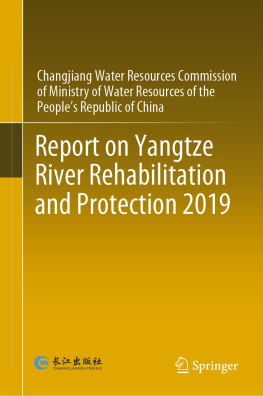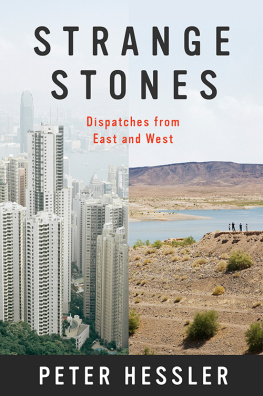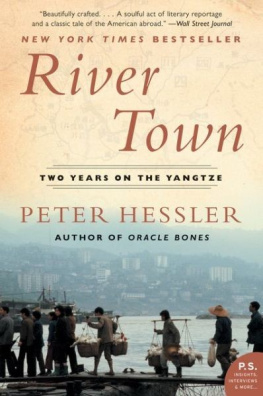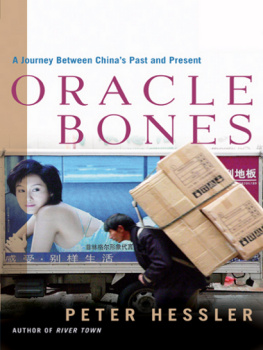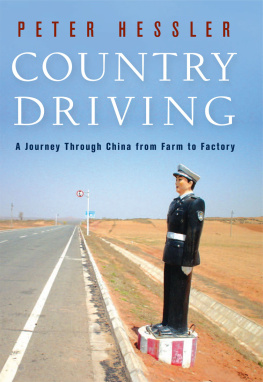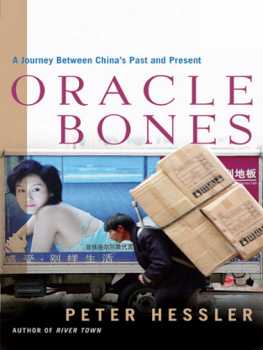River Town
Two Years on the Yangtze
Peter Hessler

for my parents
Contents
Downstream
Shakespeare with Chinese Characteristics
Running
The Dam
Opium Wars
Storm
Summer
Chinese Life
Money
Chinese New Year
Spring Again
Upstream
THE CHAPTERS OF THIS BOOK describe my life in Fuling, while the interspersed sketches focus on the local landscape, its history, and the people. All of these sketches were written while I still lived there, and Ive used this structure to give the reader some sense of the two roles that a foreigner plays in a town like Fuling. Sometimes I was an observer, while at other moments I was very much involved in local life, and this combination of distance and intimacy was part of what shaped my two years in Sichuan.
A few of the characters names and other identifying features have been changed in cases where the subject matter is sensitive. Ive relied on the standard pinyin romanization for most of the Chinese names and words, with exceptions for a few well-known names such as Yangtze and Hong Kong.
This isnt a book about China. Its about a certain small part of China at a certain brief period in time, and my hope has been to capture the richness of both the moment and the place. The place I know wellthe murky Yangtze, the green well-worked mountainsbut the moment is more difficult to define. Fuling was situated midriver both geographically and historically, and sometimes it was hard to see where things came from and where they were going. But the town and its people were always full of life and energy and hope, which in the end is my subject. Rather than an inquiry into a source or a destination, this is an account of what it was like to spend two years in the heart of the great rivers current.
Downstream
I CAME TO FULING on the slow boat downstream from Chongqing. It was a warm, clear night at the end of August in 1996stars flickering above the Yangtze River, their light too faint to reflect off the black water. A car from the college drove us along the narrow streets that twisted up from the docks. The city rushed past, dim and strange under the stars.
There were two of us. We had been sent to work as teachers, and both of us were young: I was twenty-seven and Adam Meier was twenty-two. We had heard almost nothing about Fuling. I knew that part of the city would be flooded by the new Three Gorges Dam, and I knew that for many years Fuling had been closed to outsiders. Other than that I had been told very little.
No Americans had lived there for half a century. Later, I would meet older people in town who remembered some American residents in the 1940s, before the 1949 Communist Liberation, but such memories were always vague. When we arrived, there was one other foreigner, a German who was spending a semester teaching at a local high school. But we met him only once, and he left not long after we settled in. After that we were the only foreigners in town. The population was about 200,000, which made it a small city by Chinese standards.
There was no railroad in Fuling. It had always been a poor part of Sichuan province and the roads were bad. To go anywhere you took the boat, but mostly you didnt go anywhere. For the next two years the city was my home.
A WEEK AFTER WE ARRIVED , everybody in the college gathered at the front gate. A group of students and teachers had spent the summer walking from Fuling to Yanan, the former revolutionary base in northern Shaanxi province, and now they were returning to school.
It was the sixtieth anniversary of the Long March, the six-thousand-mile trek that the Red Army had made during the most critical part of the civil war, when the Kuomintang was on the verge of destroying Mao Zedongs forces. Against all odds the Communists had marched to safety, over the mountains and deserts of western China, and from Yanan they had steadily built their strength until at last their revolution carried the nation, driving the Kuomintang to Taiwan.
All semester there were special events in the college to commemorate the anniversary of the march. The students took classes on the history of the Long March, they wrote essays about the Long March, and in December there was a Long March Singing Contest. For the Long March Singing Contest, all of the departments practiced their songs for weeks and then performed in the auditorium. Many of the songs were the same, because the musical potential of the Long March is limited, which made the judging difficult. It was also confusing because costumes were in short supply and so they were shared, like the songs. The history department would perform, resplendent in clean white shirts and red ties, and then they would go offstage and quickly give their shirts and ties to the politics department, who would get dressed, rush onstage, and sing the same song that had just been sung. By the end of the evening the shirts were stained with sweat and everybody in the audience knew all the songs. The music department won, as they always did, and English was near the back. The English department never won any of the colleges contests. There arent any English songs about the Long March.
But the summer walk to Yanan was not a contest, and the return of the Fuling group was by far the biggest event of the Long March season. They had walked more than a thousand miles, all of it in the brutal heat of the Chinese summer, and in the end only sixteen had made it. Thirteen were students, and two were teachers: the Chinese departments Communist Party Secretary and the math departments Assistant Political Adviser. There was also a lower-level administrator, who had burst into tears in the middle of the walk and gained a measure of local fame for his perseverance. All of the participants were men. Some of the women students had wanted to come along, but the college had decided that the Long March was not for girls.
A week before the assembly, President Li, the head of the college, had traveled to Xian to meet the marching students, because at the finish of the trek they had run into trouble.
The students have some kind of problem, said Dean Fu Muyou, the head of the English department, when I asked him what had happened. I think they probably have no money left. And it was truethey had run out of cash, despite their sponsorship by Magnificent Sound cigarettes, the Fuling tobacco company. It struck me as a particularly appropriate way to honor the history of Chinese Communism, to march a thousand miles and end up bankrupt in Yanan.
But President Li had been able to bail them out, and now the entire student body of the college met in the plaza near the front gate. It was a small teachers college with an enrollment of two thousand students, and it had been opened in 1977, one of many that were founded after the 19661976 Cultural Revolution had destroyed much of Chinas education system. On the spectrum of Chinese higher education, this type of teachers college was near the bottom. Courses took three years and the degree was considered lower than a bachelors, and nearly all of the students came from peasant homes in the countryside of Sichuan province. After graduation they returned to their hometowns, where they became teachers in rural middle-schools.

